accustomed to 与used to的用法
- 格式:doc
- 大小:24.50 KB
- 文档页数:1
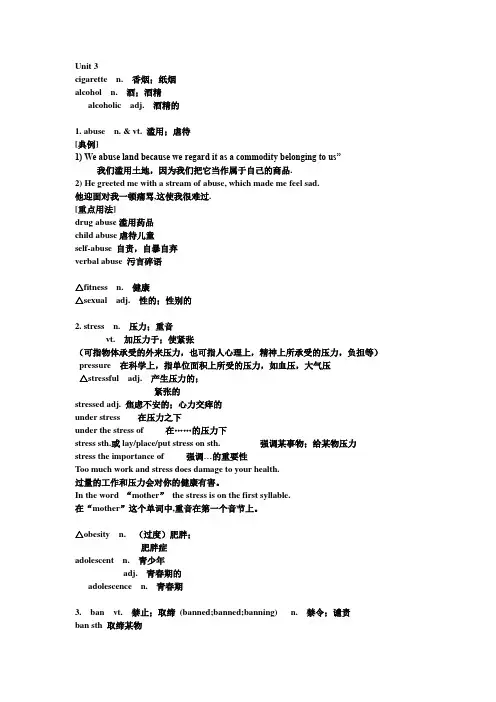
Unit 3cigarette n. 香烟;纸烟alcohol n. 酒;酒精alcoholic adj. 酒精的1. abuse n. & vt. 滥用;虐待[典例]1) We abuse land because we regard it as a commodity belonging to us”我们滥用土地,因为我们把它当作属于自己的商品.2) He greeted me with a stream of abuse, which made me feel sad.他迎面对我一顿痛骂,这使我很难过.[重点用法]drug abuse滥用药品child abuse虐待儿童self-abuse 自责,自暴自弃verbal abuse 污言碎语△fitness n. 健康△sexual adj. 性的;性别的2. stress n. 压力;重音vt. 加压力于;使紧张(可指物体承受的外来压力,也可指人心理上,精神上所承受的压力,负担等)pressure 在科学上,指单位面积上所受的压力,如血压,大气压△stressful adj. 产生压力的;紧张的stressed adj. 焦虑不安的;心力交瘁的under stress 在压力之下under the stress of 在……的压力下stress sth.或lay/place/put stress on sth. 强调某事物;给某物压力stress the importance of 强调…的重要性Too much work and stress does damage to your health.过量的工作和压力会对你的健康有害。
In the word “mother”the stress is on the first syllable.在“mother”这个单词中,重音在第一个音节上。
△obesity n. (过度)肥胖;肥胖症adolescent n. 青少年adj. 青春期的adolescence n. 青春期3. ban vt. 禁止;取缔(banned;banned;banning) n. 禁令;谴责ban sth 取缔某物ban sb from doing sth 禁止某人做某事a ban on 有关…的禁令I certainly think there should be a ban on tobacco advertising.我确实认为应该禁止香烟广告.Canada will ban smoking in all offices later this year.加拿大将从今年晚些时候起在办公场所全面禁烟。
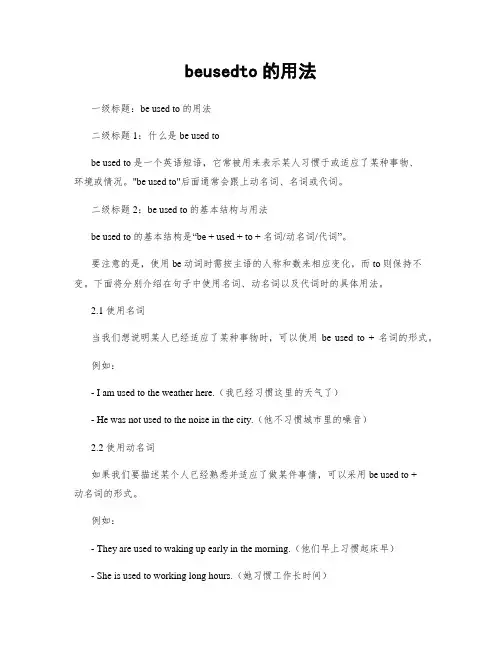
beusedto的用法一级标题:be used to的用法二级标题1:什么是be used tobe used to 是一个英语短语,它常被用来表示某人习惯于或适应了某种事物、环境或情况。
"be used to"后面通常会跟上动名词、名词或代词。
二级标题2:be used to的基本结构与用法be used to 的基本结构是“be + used + to + 名词/动名词/代词”。
要注意的是,使用be动词时需按主语的人称和数来相应变化,而to则保持不变。
下面将分别介绍在句子中使用名词、动名词以及代词时的具体用法。
2.1 使用名词当我们想说明某人已经适应了某种事物时,可以使用be used to + 名词的形式。
例如:- I am used to the weather here.(我已经习惯这里的天气了)- He was not used to the noise in the city.(他不习惯城市里的噪音)2.2 使用动名词如果我们要描述某个人已经熟悉并适应了做某件事情,可以采用 be used to +动名词的形式。
例如:- They are used to waking up early in the morning.(他们早上习惯起床早)- She is used to working long hours.(她习惯工作长时间)2.3 使用代词当我们想强调某个人或群体已经习惯了一个特定的东西时,可以使用 be used to + 代词的形式。
例如:- Jack is used to it.(杰克习惯了)- We are not used to this kind of behavior.(我们不习惯这种行为)二级标题3:be used to与其他表达相比较除了be used to之外,在英语中还有一些类似表达方式,它们可能会让初学者感到困惑。
下面将be used to与be accustomed to和get/ becomeaccustomed/used/accustomed to进行对比说明。
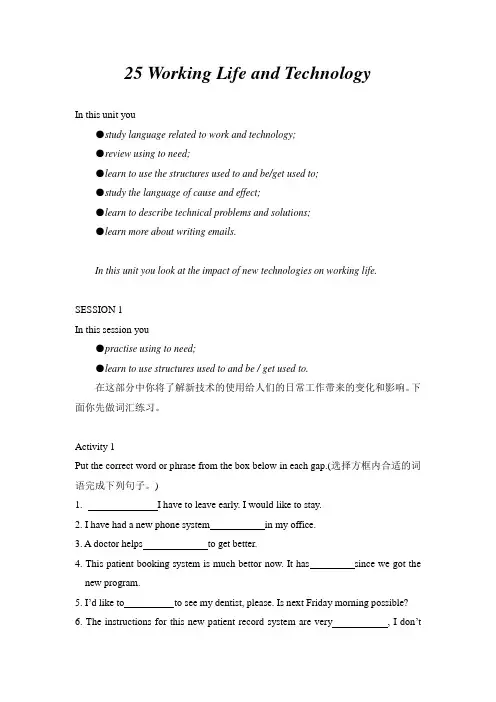
25 Working Life and TechnologyIn this unit you●study language related to work and technology;●review using to need;●learn to use the structures used to and be/get used to;●study the language of cause and effect;●learn to describe technical problems and solutions;●learn more about writing emails.In this unit you look at the impact of new technologies on working life.SESSION 1In this session you●practise using to need;●learn to use structures used to and be / get used to.在这部分中你将了解新技术的使用给人们的日常工作带来的变化和影响。
下面你先做词汇练习。
Activity 1Put the correct word or phrase from the box below in each gap.(选择方框内合适的词语完成下列句子。
)1. I have to leave early. I would like to stay.2. I have had a new phone system in my office.3. A doctor helps to get better.4. This patient booking system is much bettor now. It has since we got the new program.5. I’d like to to see my dentist, please. Is next Friday morning possible?6. The instructions for this new patient record system are very , I don’tunderstand them.7. After they switched on the computer, it took a few seconds for the picture to on the screen.8. There are many advantages to having a very fast computer, but the is they cost.9. I’m not this new program. Can you show me how to use it?10. The hospital was closed down. The medical staff were transferred and everybody else was made .Simon是一所医院的管理人员,Brett是该医院的医生,他在国外工作了几个月后回到医院。
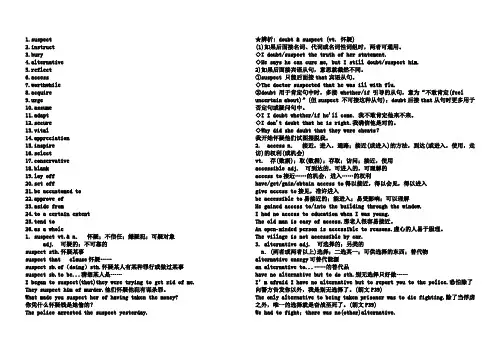
1.suspect2.instruct3.bury4.alternative5.reflect6.access7.worthwhile8.acquire9.urge10.assume11.adapt12.secure13.vital14.appreciation15.inspire16.select17.conservative18.blanky off20.set off21.be accustomed to22.approve of23.aside from24.to a certain extent25.tend to26.as a whole1. suspect vt.& n.怀疑;不信任;嫌疑犯;可疑对象adj. 可疑的;不可靠的suspect sth.怀疑某事suspect that clause怀疑……suspect sb.of(doing)sth.怀疑某人有某种罪行或做过某事suspect sb.to be...猜想某人是……I began to suspect(that)they were trying to get rid of me. They suspect him of murder.他们怀疑他犯有谋杀罪。
What made you suspect her of having taken the money?你凭什么怀疑钱是她偷的?The police arrested the suspect yesterday. ★辨析: doubt & suspect (vt. 怀疑)(1)如果后面接名词、代词或名词性词组时,两者可通用。
◇I doubt/suspect the truth of her statement.◇He says he can cure me, but I still doubt/suspect him.2)如果后面接宾语从句,意思就截然不同。
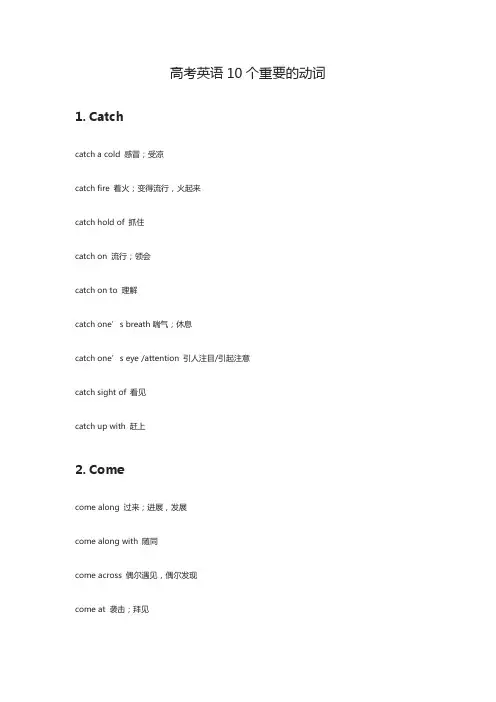
高考英语10个重要的动词1. Catchcatch a cold 感冒;受凉catch fire 着火;变得流行,火起来catch hold of 抓住catch on 流行;领会catch on to 理解catch one’s breath喘气;休息catch one’s eye /attention 引人注目/引起注意catch sight of 看见catch up with 赶上2. Comecome along 过来;进展,发展come along with 随同come across 偶尔遇见,偶尔发现come at 袭击;拜见come by 从旁走过come around 到来/苏醒,恢复/改变看法或立场come around / round to 赞成;同意come back 回来/想起,记起come by获得,得到;拜访,串门come between 离间,使分开,使产生隔阂come down with 因……而病倒;患…病come down 流传come to the point 抓住要点come into contact with 与……接触come in for 遭到,受到(责备等):The reporter’s work came in for criticism. come on 发生,赶快come off 发生,举行come off it 别傻了,别闹笑话了,别出洋相了come out 发行;被告知;结果是;公开宣称come into operation 启用come to a standstill 停止come to a stop 停止;到站come to an end 结束come to light 真相大白;显露come true 梦想成真come through 按要求(或期望)做:I asked for their help, and they came through.我向他们求助,他们就帮了我。
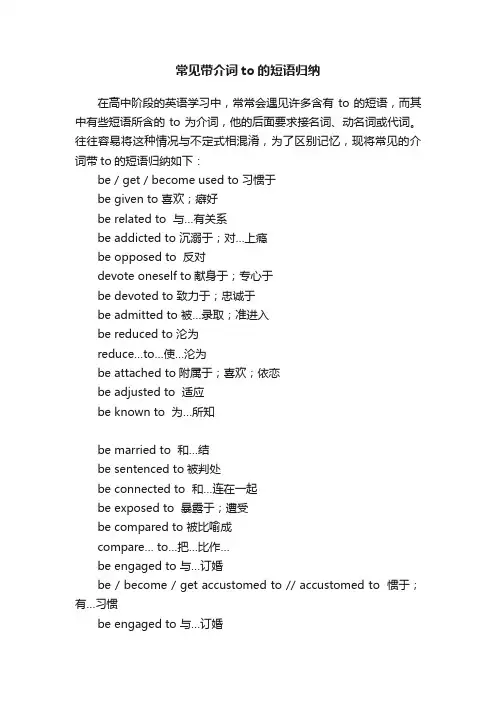
常见带介词to的短语归纳在高中阶段的英语学习中,常常会遇见许多含有to的短语,而其中有些短语所含的to为介词,他的后面要求接名词、动名词或代词。
往往容易将这种情况与不定式相混淆,为了区别记忆,现将常见的介词带to的短语归纳如下:be / get / become used to 习惯于be given to 喜欢;癖好be related to 与…有关系be addicted to 沉溺于;对…上瘾be opposed to 反对devote oneself to献身于;专心于be devoted to 致力于;忠诚于be admitted to 被…录取;准进入be reduced to 沦为reduce…to…使…沦为be attached to附属于;喜欢;依恋be adjusted to 适应be known to 为…所知be married to 和…结be sentenced to被判处be connected to 和…连在一起be exposed to 暴露于;遭受be compared to 被比喻成compare… to…把…比作…be engaged to 与…订婚be / become / get accustomed to // accustomed to 惯于;有…习惯be engaged to 与…订婚get down to 着手做lead to 导致object to反对;不喜欢;不赞成put one’s mind to全神贯注于give rise to 引起look forward to 盼望stick to 坚持pay attention to 注意attend to 专心;注意;照料see to 负责;注意contribute to对…作贡献;有助于make contributions to对…作贡献apply oneself to 致力于come close to几乎;将近reply to 回答add to 增加add up to 加起来in addition to除…之外turn to转向;求助于feel up to 能胜任于look up to 尊敬admit to承认belong to 属于take to 喜爱;开始cling to 附着fall to 开始respond to 回答;对…作出回应accustom oneself to 使自己习惯于amount to等于prefer… to…更喜欢set an example to 给…树立榜样refer to 谈到;参考;查阅agree to sth. 同意某事(比较:agree to do sth. 同意做某事)prefer… to…更喜欢take / make a trip to到…地方去join…to…把…和…连接起来turn a blind eye to对…视而不见turn a deaf ear to 对…充耳不闻show honor to向…表示敬意put an end to(bring… to an end) 结束set fire to 放火烧……drink (a toast) to 为……干杯propose a toast to 提议……happen to… 发生了……事occur to sb. 想起;想到total up to 总计达be close to 几乎;将近hold to 坚持;抓住help oneself to 随便用……hold on to 抓住;固守do harm to 对……有害处do wrong to 冤枉某人date back to 追溯到when it comes to… 谈到……时come to 来到;达到;结果为 (比较:come to do sth逐渐做某事)give an eye to着眼于have an eye to doing 打算the key to ……的答案describe to 向……描述treat sb. to sth. 请某人吃……trust sth. to sb.把某物委托给某人pay a visit to 参观……access to 进入;取得的方法be a stranger to 不习惯;对……陌生on one’s way to 在去某处的路上;在达成某事的过程中be kind to 对……和善be important to 对……重要be senior to 年龄长于……be equal to 和……相等be particular to ……所特有的(比较:be particular about 对……过于讲究;挑剔)be subject to 服从;隶属;易遭受患be familiar to 为……熟悉be similar to 和……相似be open to 对……开放be loyal to 对……忠诚be helpful to对……有益处be useful to对……有用be good to sb对某人好(比较:be good for 对……有益处)be bad to 对……不好be bad for(比较:对……有害处)be new to 对……不习惯;对……陌生as to 关于;至于next to(否定词前)几乎;be due to do sth.预定要做某事next to ……的旁边due to 由于;归因于……thanks to 多亏了;由于owing to 由于;因……的缘故in / with regard to 关于in /with relation to 关于;就……而论subject to 在……条件下;依照be given to 沉溺于be related to 与…相关get down to着手做lead to 着手做object to / be opposed to 反对put one’s mind to全神贯注于be equal to 胜任devote oneself to献身于give rise to 引起look forward to 盼望pay attention to 注意lead to通向 see to 负责access to 接近(某地的)方法be addicted to 沉溺于…对…上瘾according to 根据contribute to 为…作贡献如:1. access to 接近,进入(某地的)方法; 通路The only access to that building is along that muddy track. 到那栋建筑的唯一通路是沿着那条泥泞的路走。
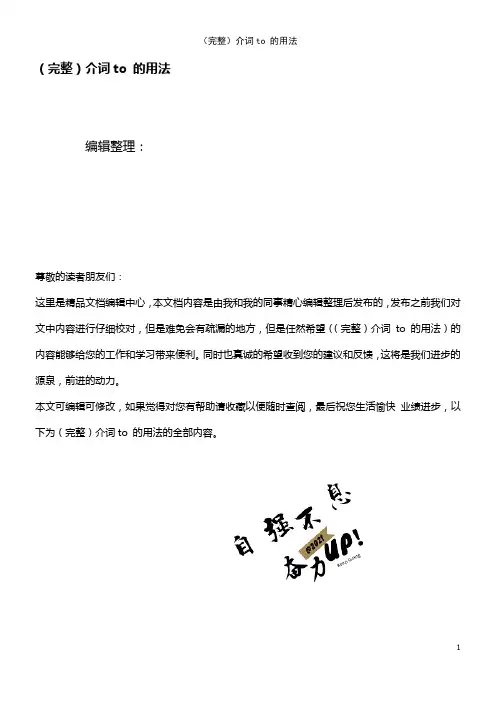
(完整)介词to 的用法编辑整理:尊敬的读者朋友们:这里是精品文档编辑中心,本文档内容是由我和我的同事精心编辑整理后发布的,发布之前我们对文中内容进行仔细校对,但是难免会有疏漏的地方,但是任然希望((完整)介词to 的用法)的内容能够给您的工作和学习带来便利。
同时也真诚的希望收到您的建议和反馈,这将是我们进步的源泉,前进的动力。
本文可编辑可修改,如果觉得对您有帮助请收藏以便随时查阅,最后祝您生活愉快业绩进步,以下为(完整)介词to 的用法的全部内容。
介词to后+动名词一览表由于to既可用作介词,也可用作不定式符号,所以其后接动词时,使用动词原形还是动名词不好判断;现对这类结构作以归纳,总结出介词to后接动名词的常考结构27个,并根据其特点,分为以下四类:一. 动词+介词to+动名词结构1。
admit to doing 承认做某事 2. apply to doing适用于做某事3. object to doing 反对做某事4. see to doing 负责做某事5。
stick to doing 坚持做某6。
take to doing 喜欢上做某事,逐渐习惯做某事7.lead to 通向8. devote oneself to doing专心致力于做某事,献身做某事eg. he admitted to having stolen the money.他承认投了钱these methods apply to learning english。
这些方法适用于he objected to being treated like a child。
他反对被当作小孩子看待reporters should stick to investigating the facts. 记者应坚持调查事实.soon he took to sleeping late. 不久他就养成了睡懒觉的习惯二。
动词+宾语+介词to+动名词作宾语结构9。
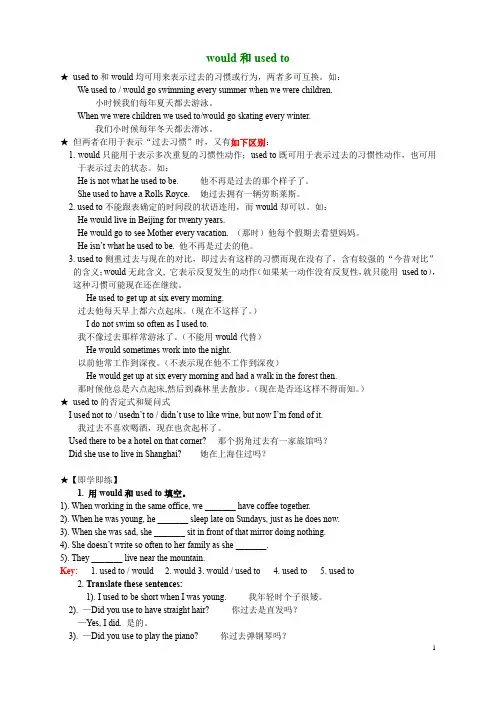
would和used to★used to和would均可用来表示过去的习惯或行为,两者多可互换。
如:We used to / would go swimming every summer when we were children.小时候我们每年夏天都去游泳。
When we were children we used to/would go skating every winter.我们小时候每年冬天都去滑冰。
★但两者在用于表示“过去习惯”时,又有如下区别:1. would只能用于表示多次重复的习惯性动作;used to既可用于表示过去的习惯性动作,也可用于表示过去的状态。
如:He is not what he used to be. 他不再是过去的那个样子了。
She used to have a Rolls Royce. 她过去拥有一辆劳斯莱斯。
2. used to不能跟表确定的时间段的状语连用,而would却可以。
如:He would live in Beijing for twenty years.He would go to see Mother every vacation. (那时)他每个假期去看望妈妈。
He isn’t what he used to be. 他不再是过去的他。
3. used to侧重过去与现在的对比,即过去有这样的习惯而现在没有了,含有较强的“今昔对比”的含义;would无此含义, 它表示反复发生的动作(如果某一动作没有反复性,就只能用used to),这种习惯可能现在还在继续。
He used to get up at six every morning.过去他每天早上都六点起床。
(现在不这样了。
)I do not swim so often as I used to.我不像过去那样常游泳了。
(不能用would代替)He would sometimes work into the night.以前他常工作到深夜。
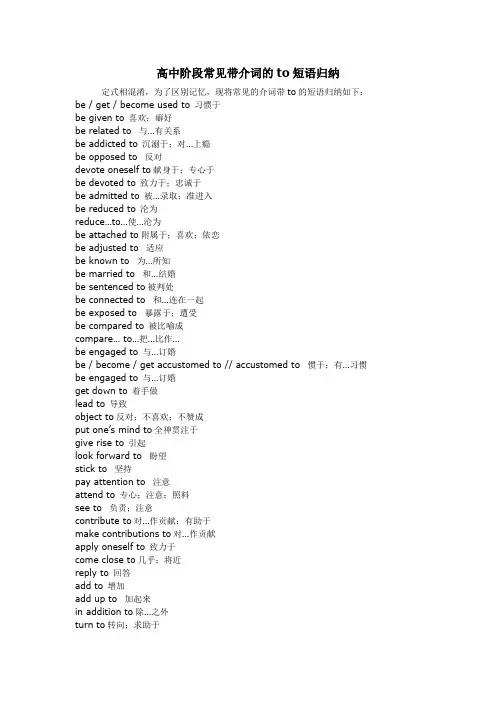
高中阶段常见带介词的to短语归纳定式相混淆,为了区别记忆,现将常见的介词带to的短语归纳如下:be / get / become used to 习惯于be given to 喜欢;癖好be related to 与…有关系be addicted to 沉溺于;对…上瘾be opposed to 反对devote oneself to献身于;专心于be devoted to 致力于;忠诚于be admitted to 被…录取;准进入be reduced to 沦为reduce…to…使…沦为be attached to附属于;喜欢;依恋be adjusted to 适应be known to 为…所知be married to 和…结婚be sentenced to被判处be connected to 和…连在一起be exposed to 暴露于;遭受be compared to 被比喻成compare… to…把…比作…be engaged to 与…订婚be / become / get accustomed to // accustomed to 惯于;有…习惯be engaged to 与…订婚get down to 着手做lead to 导致object to反对;不喜欢;不赞成put one’s mind to全神贯注于give rise to 引起look forward to 盼望stick to 坚持pay attention to 注意attend to 专心;注意;照料see to 负责;注意contribute to对…作贡献;有助于make contributions to对…作贡献apply oneself to 致力于come close to几乎;将近reply to 回答add to 增加add up to 加起来in addition to除…之外turn to转向;求助于feel up to 能胜任于look up to 尊敬admit to承认belong to 属于take to 喜爱;开始cling to 附着fall to 开始respond to 回答;对…作出回应accustom oneself to 使自己习惯于amount to等于prefer… to…更喜欢set an example to 给…树立榜样refer to 谈到;参考;查阅agree to sth. 同意某事(比较:agree to do sth. 同意做某事)prefer… to…更喜欢take / make a trip to到…地方去join…to…把…和…连接起来turn a blind eye to对…视而不见turn a deaf ear to 对…充耳不闻show honor to向…表示敬意put an end to(bring… to an end) 结束set fire to 放火烧……drink (a toast) to 为……干杯propose a toast to 提议……happen to… 发生了……事occur to sb. 想起;想到total up to 总计达be close to 几乎;将近hold to 坚持;抓住help oneself to 随便用……hold on to 抓住;固守do harm to 对……有害处do wrong to 冤枉某人date back to 追溯到when it comes to… 谈到……时come to 来到;达到;结果为(比较:come to do sth逐渐做某事) give an eye to着眼于have an eye to doing 打算the key to ……的答案describe to 向……描述treat sb. to sth. 请某人吃……trust sth. to sb.把某物委托给某人pay a visit to 参观……access to 进入;取得的方法be a stranger to 不习惯;对……陌生on one’s way to 在去某处的路上;在达成某事的过程中be kind to 对……和善be important to 对……重要be senior to 年龄长于……be equal to 和……相等be particular to ……所特有的(比较:be particular about 对……过于讲究;挑剔)be subject to 服从;隶属;易遭\受\患be familiar to 为……熟悉be similar to 和……相似be open to 对……开放be loyal to 对……忠诚be helpful to对……有益处be useful to对……有用be good to sb对某人好(比较:be good for 对……有益处)be bad to 对……不好be bad for(比较:对……有害处)be new to 对……不习惯;对……陌生as to 关于;至于next to(否定词前)几乎;be due to do sth.预定要做某事next to ……的旁边due to 由于;归因于……thanks to 多亏了;由于owing to 由于;因……的缘故in / with regard to 关于in /with relation to 关于;就……而论subject to 在……条件下;依照be given to 沉溺于be related to 与…相关get down to着手做lead to 着手做object to / be opposed to 反对put one’s mind to全神贯注于be equal to 胜任devote oneself to献身于give rise to 引起look forward to 盼望pay attention to 注意lead to通向see to 负责access to 接近(某地的)方法be addicted to 沉溺于…对…上瘾according to 根据contribute to 为…作贡献如:1. access to 接近,进入(某地的)方法; 通路The only access to that building is along that muddy track.到那栋建筑的唯一通路是沿着那条泥泞的路走。
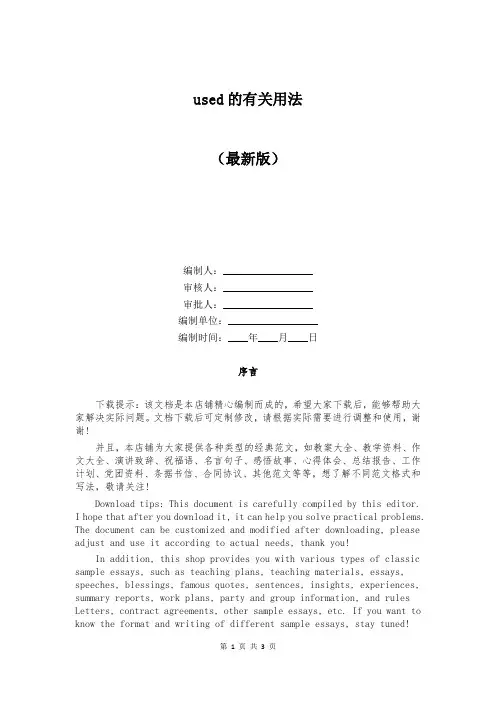
used的有关用法(最新版)编制人:__________________审核人:__________________审批人:__________________编制单位:__________________编制时间:____年____月____日序言下载提示:该文档是本店铺精心编制而成的,希望大家下载后,能够帮助大家解决实际问题。
文档下载后可定制修改,请根据实际需要进行调整和使用,谢谢!并且,本店铺为大家提供各种类型的经典范文,如教案大全、教学资料、作文大全、演讲致辞、祝福语、名言句子、感悟故事、心得体会、总结报告、工作计划、党团资料、条据书信、合同协议、其他范文等等,想了解不同范文格式和写法,敬请关注!Download tips: This document is carefully compiled by this editor.I hope that after you download it, it can help you solve practical problems. The document can be customized and modified after downloading, please adjust and use it according to actual needs, thank you!In addition, this shop provides you with various types of classic sample essays, such as teaching plans, teaching materials, essays, speeches, blessings, famous quotes, sentences, insights, experiences, summary reports, work plans, party and group information, and rules Letters, contract agreements, other sample essays, etc. If you want to know the format and writing of different sample essays, stay tuned!used的有关用法used的有关用法和used有关的四种表达式:ed to do sth 过去常常做某事(暗示现在已经不再做了。
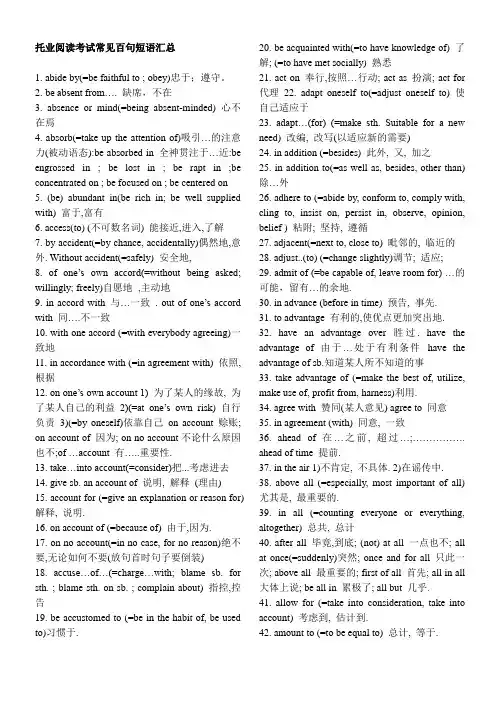
托业阅读考试常见百句短语汇总1.abide by(=be faithful to ; obey)忠于;遵守。
2.be absent from…. 缺席,不在3. absence or mind(=being absent-minded) 心不在焉4. absorb(=take up the attention of)吸引…的注意力(被动语态):be absorbed in 全神贯注于…近:be engrossed in ; be lost in ; be rapt in ;be concentrated on ; be focused on ; be centered on5. (be) abundant in(be rich in; be well supplied with) 富于,富有6. access(to) (不可数名词) 能接近,进入,了解7. by accident(=by chance, accidentally)偶然地,意外. Without accident(=safely) 安全地,8. of one’s own accord(=without being ask ed; willingly; freely)自愿地,主动地9. in accord with 与…一致. out of one’s accord with 同….不一致10. with one accord (=with everybody agreeing)一致地11. in accordance with (=in agreement with) 依照,根据12. on one’s own account 1) 为了某人的缘故, 为了某人自己的利益2)(=at one’s own risk) 自行负责3)(=by oneself)依靠自己on account 赊账; on account of 因为; on no account不论什么原因也不;of …account 有…..重要性.13. take…into account(=consider)把...考虑进去14. give sb. an account of 说明, 解释(理由)15. account for (=give an explanation or reason for) 解释, 说明.16. on account of (=because of) 由于,因为.17. on no account(=in no case, for no reason)绝不要,无论如何不要(放句首时句子要倒装)18. accuse…of…(=charge…with; blame sb. for sth. ; blame sth. on sb. ; complain about) 指控,控告19. be accustomed to (=be in the habit of, be used to)习惯于. 20. be acquainted with(=to have knowledge of) 了解; (=to have met socially) 熟悉21. act on 奉行,按照…行动; act as 扮演; act for 代理22. adapt oneself to(=adjust oneself to) 使自己适应于23. adapt…(for) (=make sth. Suitable for a new need) 改编, 改写(以适应新的需要)24. in addition (=besides) 此外, 又, 加之25. in addition to(=as well as, besides, other than)除…外26. adhere to (=abide by, conform to, comply with, cling to, insist on, persist in, observe, opinion, belief ) 粘附; 坚持, 遵循27. adjacent(=next to, close to) 毗邻的, 临近的28. adjust..(to) (=change slightly)调节; 适应;29. admit of (=be capable of, leave room for) …的可能,留有…的余地.30. in advance (before in time) 预告, 事先.31. to advantage 有利的,使优点更加突出地.32. have an advantage over 胜过. have the advantage of 由于…处于有利条件have the advantage of sb.知道某人所不知道的事33. take advantage of (=make the best of, utilize, make use of, profit from, harness)利用.34. agree with 赞同(某人意见) agree to 同意35. in agreement (with) 同意, 一致36. ahead of 在…之前, 超过…;……………. ahead of time 提前.37. in the air 1)不肯定, 不具体. 2)在谣传中.38. above all (=especially, most important of all) 尤其是, 最重要的.39. in all (=counting everyone or everything, altogether) 总共, 总计40. after all 毕竟,到底; (not) at all 一点也不; all at once(=suddenly)突然; once and for all 只此一次; above all 最重要的; first of all 首先; all in all 大体上说; be all in 累极了; all but 几乎.41. allow for (=take into consideration, take into account) 考虑到, 估计到.42. amount to (=to be equal to) 总计, 等于.43.answer for (undertake responsibility for, be liable for, take charge for) 对…负责.44. answer to (=conform to) 适合,符合.45. be anxious about 为…焦急不安; 或anxious for46. apologize to sb. for sth. 为…向…道歉47. appeal to sb. for sth. 为某事向某人呼吁. appeal to sb. 对某人有吸引力48. apply to sb. for sth. 为…向…申请; apply for 申请; apply to 适用.49. apply to 与…有关;适用50. approve of (=consent to, be in favor of, favor, agree to, consider good, right) 赞成, approve vt. 批准51. arise from(=be caused by) 由…引起.52. arrange for sb./sth. to do sth. 安排…做…53. arrive on 到达; arrive at 到达某地(小地方);得出,作出; arrive in 到达某地(大地方);54. be ashamed of (=feel shame, guilt or sorrow because of sth. done) 以…为羞耻55. assure sb. of sth. (=try to cause to believe or trust in sth.) 向…保证, 使…确信.56. attach(to) (=to fix, fasten; join) 缚, 系,结57. make an attempt at doing sth. (to do sth.) 试图做…58. attend to (=give one’s attention, care and thought)注意,照顾;attend on(upon)(=wait upon, serve, look after) 侍候,照料59. attitude to/ toward …对…的态度.看法60. attribute…to…(=to believe sth. to be the result of…)把..归因于.., 认为..是..的结果61. on the average (=on average, on an average) 平均62. (be) aware of (=be conscious of , having knowledge or consciousness)意识到,知道.63. at the back of (=behind) 在…后面64. in the back of 在…后部(里面); on the back of 在…后部(外面); be on one’s back(=be ill in bed) 卧病不起. 65. at one’s back(=supporting or favoring sb.) 支持,维护; have sb. at one’s back 有…支持, 有…作后台66. turn one’s back on sb. (=turn away from sb. in an impolite way) 不理睬(某人),背弃,抛弃67. behind one’s back 背着某人(说坏话)68. be based on / upon 基于69. on the basis of 根据…, 在…基础上70. beat…at 在…运动项目上打赢71. begin with 以…开始. to begin with (=first of all) 首先, 第一(经常用于开始语)72. on behalf of (=as the representative of) 以…名义73. believe in(=have faith or trust in; consider sth./sb. to be true) 相信,依赖,信仰.74. benefit (from) 受益,得到好处.75. for the benefit of 为了…的利益(好处)76. for the better 好转77. get the better of (=defeat sb.) 打败, 胜过.78. by birth 在出生上,论出身,按血统at birth 在出生时; give birth to 出生79. blame sb. for sth. 因…责备某人. blame sth. on sb. 把…推在某人身上80. in blossom开花(指树木) be in blossom开花(强调状态) come into blossom开花(强调动作)81. on board 到船上, 在船上, 上火车或飞机82. boast of (or about) 吹嘘83. out of breath 喘不过气来84. in brief(=in as few words as possible)简言之85. in bulk 成批地,不散装的86. take the floor 起立发言87. on business 出差办事.88. be busy with sth.于某事。
to的用法语法To的用法语法详解一、to作介词的用法1. 表示方向或目的:We are going to the park tomorrow.(我们明天要去公园。
)2. 表示接触:She ran to him and gave him a big hug.(她跑向他,并给了他一个大大的拥抱。
)3. 表示比较:She is much taller compared to her sister.(她比起她姐姐来说要高得多。
)4. 表示时间:He comes to visit us every Sunday.(他每周日都来看望我们。
)二、to作不定式标记词的用法1. 不定式作目的状语:I went to the supermarket to buy some groceries.(我去超市买了些杂货。
)2. 不定式作结果状语:He worked hard to pass the exam.(他努力学习以通过考试。
)3. 不定式作方式状语:She walked slowly to enjoy the scenery along the way.(她慢慢地走着,欣赏沿途的风景。
)4. 不定式作条件状语:You need to study hard in order to get good grades.(为了取得好成绩,你需要努力学习。
)三、to作动词不定式符号的用法1. 跟随感官动词:I want you to listen carefully in class.(我想让你在课堂上认真听讲。
)2. 跟随使役动词:They asked me to help them move the furniture.(他们要求我帮助他们搬家具。
)3. 跟随感观、看法、情感等动词:I find it difficult to understand his accent.(我发现很难理解他的口音。
)四、to作介词还是作不定式?如何判断?1. 根据后面的名词或代词:She gave a gift to her friend.(to作介词) vs She wants to buy a gift for her friend.(to作不定式符号)2. 根据语境及意思的逻辑性:He came to study English.(目的,to为不定式符号) vs He is close to the school.(位置,to为介词)五、常见短语和固定搭配1. be/get used to:She is slowly getting used to living in a new city.(她正在逐渐适应生活在一个新城市。
在英语中,这些介词的‘to’一定要记住!1.look forward to 盼望,期待2.be(get) accustomed to=be(get)used to •习惯于3.object to (be opposed to)对…反对4.get down to开始认真考虑;着手处理5.pay attention to注意重视catch/attract/draw/get one’s attention to吸引某人对…的注意devote one’s attention to专心于6.submit to v. 提交;向…提出;. 服从mit to交付,把…投入8.stick to v. 坚持;粘住9.be addicted to对…上瘾;沉溺于10.be adjusted to调节;调整以适应11.make contributions to为…做出贡献12.live up to不辜负;做到;实践13. be devoted to专心于/致力于…的;献身…的be devoted to duty 遵守规则14.see to注意;负责;照料15.turn a deaf ear to充耳不闻塞耳不闻不理会16.lead to导致;通向17. be attached to 喜爱;附属于18.belong to属于19.be similar to与…相似20.when it comes to当提到;就……而论21.be equal to sth./doing sth相等;胜任;合适22.be sensitive to对…感到敏感23.be /get familiar to 为……所熟知24.set an example to 为…树立榜样25. be limited to 被限制在…上set a limit to对…加以限制Add up toBe native toPrefer doing to doing Do an injured to sb.Do /cause damage to Be grateful to sb for sth, Be mean to sb.请注意到这些无的特殊副近五年英语高考120组常考形似单词大区分!1. quite [kwaɪt]相当-- quiet ['kwaɪət] 安静地2. affect [ə'fekt]v 影响, 假装-- effect [ɪ'fekt]n 结果, 影响3. adapt [ə'dæpt]适应-- adopt [ə'dɒpt]采用--adept [ə'dept]内行4. angel ['eɪndʒ(ə)l]天使--angle ['æŋg(ə)l] 角度5. dairy['deərɪ] 牛奶厂--diary ['daɪərɪ]日记6. contend 奋斗, 斗争--content[kən'tent] 内容, 满足的--context['kɒntekst] 上下文--contest ['kɒntest]竞争, 比赛7. principal ['prɪnsəp(ə)l] 校长, 主要的--principle ['prɪnsɪp(ə)l]原则8. dessert [dɪ'zɜːt] 甜食-- desert / dɪ'zɜːt/ n.沙漠v. 放弃--dissert 写论文9. pat 轻拍--tap 轻打--slap 掌击--rap 敲,打10. decent 正经的-- descent n. 向下, 血统-- descend v. 向下11. sweet [swiːt] 甜的-- sweat [swet]汗水12. later 后来-- latter 后者--latest 最近的--lately adv. 最近13. costume [kɒstjuːm]服装-- custom ['kʌstəm]习惯14. extensive[ɪk'stensɪv; ek-] 广泛的-- intensive [ɪn'tensɪv] 深刻的15. aural 耳的--oral 口头的16. abroad [ə'brɔːd]国外-- aboard [ə'bɔːd]上(船,飞机,火车等。
介词to后+动名词结构一览用法归纳由于to既可用作介词,也可用作不定式符号,所以许多学生在其后接动词时,弄不清到底该用动词原形,还是用动名词。
本文根据新课标词汇(比考试大纲词汇范围稍广)对这类结构作了一次系统归纳,总结出介词to后接动名词的常考结构27个,并根据其结构特点,分为以下四类:一、动词+介词to+动名词作宾语结构。
这一种结构是考试中的大热考点,考生容易产生定势思维,想当然的认为“to”之后要跟"to do"不定式,所以,请特别重视下列含有“to"的动词短语。
1. admit to doing sth 承认做了某事2. apply to doing sth 适用于做某事3. object to doing sth 反对做某事4. see to doing sth 负责做某事5. stick to doing sth 坚持做某事6. take to doing sth 喜欢上做某事,逐渐习惯做某事。
7. lead to通向8. see to 负责应用实例:1.He admitted having stolen the money. 他承认偷了钱。
2.These methods apply to learning English.这些方法适用于英语学习。
3.He objected to being treated like a child. 他反对被当作小孩子看待。
4.Reporters should stick to investigating the facts. 记者应坚持调查事实。
5.Soon he took to sleeping late. 不久他就养成了睡懒觉的习惯。
二、动词+宾语+介词to+动名词作宾语结构9. devote oneself to doing sth专心致力于做某事把……献给做某事;献身于做某事10. limit sth to doing sth 把…限制在做某事的范围内11. reduce sb to doing sth 使某人沦为做某事12. give one’s life to doing sth 献身于做某事13. give one’s mind to doing sth 专心做某事14. have a dislike to doing sth 厌恶做某事15. have an eye to doing sth 非常注意做某事,着眼于16. have an objection to doing sth 反对(反感)做某事17. pay attention to doing sth 注意做某事18. set one’s mind to doing sth 决心做某事应用实例:1.She applied herself to learning English. 她专心学习英语。
use的用法一、use的用法表格二、相关拓展拓展1:拓展二:常见的to是介词的短语。
be accustomed to doingdevote oneself to doinglook forward to doingpay attention to doingprefer doing to doing二、根据use 的用法,试做下列练习1.用use, used to, be/get/become used to, be used as/for 的适当形式填空。
1.As you know, cotton _________ m ake quilts.2.He came from the north, so he _________ s uch hot weather.3.Who knows the name of the tool that _________ lifting cars?4.English ________ a foreign language.5.The farmers in China ________ l ive a poor life, but now most of them live a happy life.6.Please give me a knife ________ .7.You will _______ l iving in the country.8.We _______ go there every year when I was young.9.People ________ c oal to cook and heat.10.There ________ b e a free market in this village.11.Once you _______ smoking, you can hardly stop it.12.He _______ Chinese tea five years ago when he was in China.13.A tape—recorder can _______ record your voice.14.We ______ live in the city, but now we live in the countryside.15.This machine _______ make farm tools.16.I prefer not to go there by plane. I ________ (not) flying.17.It was a bit of shock: I ________ (not) paying so much for a Beijing roast.18.The medicine ________ e xternally only.19.A new production line has been put _________ in this factory since last month.20.I _______ (not) learning in a noisy situation.21.Life here is much easier than it ____________ be.22.He ______________ hard work.23.I’ve lived in Paris for six years now, so I’m quite _______ the traffic.24.It’s difficult to understand Scottish people if you ____________ their accent.25.It was a bit of a shock: I ____________________ paying so much for a sandwich and a glass of beer.26.I don’t play tennis much these days, but I ___________ .27.The wood _____________ make desks and chairs.0.用括号中动词的适当形式填空1.You’ll soon get used to _________ (live) in the country.2.I never used to __________ (eat) cakes, but I eat a lot now.3.I’m not used to ___________ (treat) like this.4.When I was younger I was used to ____________ (walk) long distances.5.I used to __________ (go) swimming on Saturdays.6.Didn’t she use to ___________ (live) in Germany?7.My cousin is used to ________ (study) with his new friends in Australia. (南京)8.My mother is used to ________ (get) up early to cook breakfast for us. (一模)9.Mr Bush is used to __________ (get) up early in the morning. (一模)10.Jim has lived in Australia for two years. He is used to __________ (驾驶) on the left.III.单项选择1.—Is Paul playing soccer and tennis for the school?—He ________ . But now he has given them up.A. isB. has2.Bamboo can _______ water, cant it?A. get used to carryingC. have used to carry3.I'm not used to like that. C. used to D. hadB. be used to carryingD. be used to carryA. being spoken toB. be spoken toC. spoken toD. speaking to4. —Have you got used to _________ o n this kind of computer?—Not yet, because I used to _________ the abacus before.A. work; useB. working; useC. work; usingD. working; using5. He used ________ on the right in China, but he soon got used __________ on the left in England.A. to drive; to driveB. to drive; drivingC. to driving; to driveD. to drive; to driving6. Has the boy who was made use of _________ realized his mistake?A. stealingB. stolenC. to stealD. for stealing7. The old professor said to us every part of the material should be made use of _______________ the power station.A. to buildB. buildingC. buildD. built8. Every possible means ________ to prevent the air pollution, but the sky is still not clear.A. has to useB. are usedC. has been usedD. have used9. There _______ a lot of red —crowned cranes in this area.A. was used toB. was used to beC. used toD. used to be10. She used to _____ with her parents, but now she is used to _______ with her classmates at school. (泰州)11. He used to ____ i n a small village, but now he has been used to ___ in the big city. (镇江)12. Mrs Green _______ go to hospital, but now she is in good health.A. has toB. need toC. used toD. ought to13. My grandpa _______ a worker, but now he has retired.A. used to beB. use to beC. isD. used to have14. We ________ in this pool when we were young, but now it ______ fish.B. are used to swimming, is used to keep.C. used to swim, used to keepD. used to swim, is used for keeping15. My sister ________ a car to go to work, but now he walks to work.A. used to driveB. use to driveC. drivesD. used to driving16. Mr. Brown ______ go to bed late, but now he _______ going to bed early.A. used to, used toB. used to, is used toC. is used to, used to 17. The knife is ______ bread.A. used to cutB. used to cuttingC. use to cutD. used for cutA. live; livingB. live; liveC. living; livingD. living; liveA. live; livingB. live; liveC. living;livingD. living; live A. are used to swim, used to D. is used to, is used to18.He used to ________ i n the sun, but now he is sued to ___________ at night.A. read, readB. reading, readC. read, readingD. reading, reading19.This kind of cloth is used ______ dress.A. to makingB. to makeC. to be madeD. making20.How does Jack usually go to school? —He ___ride a bike, but now he ___there to lose weight.A. used to, is used to walkB. was used to, is used to walkingC. was used to, is used to walk C. used to, is used to walking21.There _______ a lot of red—crowned cranes in this area.A. was used toB. was used to beC. used toD. used to be22.She used to ______ with her parents, but now she is used to _______ with her classmates at school. (泰州)A. live; livingB. live; liveC. living; livingD. living; live23.He used to ___ in a small village, but now he has been used to ___ in the big city. (镇江)A. live; livingB. live; liveC. living;livingD. living; live24.Mrs Green ______ go to hospital, but now she is in good health.A. has toB. need toC. used toD. ought to25.My grandfather ______ a policeman when he was young.A. use to beB. used to isC. used to areD. used to beW.翻译句子1.几个月后他就习惯了一个人生活了。
以下词组搭配中的to为介词后跟名词或动名词look forward to…pay attention to…adapt (oneself) to…(使)适应…be adapted/accustomed/used to…习惯于…refer to…参考;提及;指…devote oneself/sth to…= sb. is devoted to…奉献于,致力于…expose sb./sth. to…使暴露在…下;使接触…(但多用于被动)sb./sth. be exposed to…暴露在…下;接触…lead to… =result in…= contribute to 导致,促成make a contribution / contributions to…为…作出贡献the way to …(通往…的路) 区分:the way to do sth. (做某事的方法)a shortcut to…通往…的捷径the entrance/access/key/approach/monument/clue/answer to…a (brief) introduction to sth. sth简介a note to sth. …的注解a reply/response to…对…的回复、回应one’s action to…某人对…的反应a witness to……的目击者one’s attitude to/towards…对…的态度to one’s surprise/disappointment/pleasure/relief/astonishmentadmit (to) sth./doing…(to可省略)承认做过某事thanks to=owing to=because of 因为,由于admit sb. to…允许某人进入…/ 录取某人进…sp. be accessible to sb.某人可以进入/使用某地/某物sth. be available to sb. 某人可以获得,使用,买到,借到…某物when it comes to…当提及…的时候object to sth/doing…反对…= make/raise an objection to…= be opposed to…have no objection to…react to sth. 对…作出回应one’s reaction to…go/come/rush to one’s rescue/aid 赶去/来救援、帮助某人dance to the music 随着音乐而起舞exercise to music 跟着音乐做运动be married to sb. 与某人结了婚的(状态)sentence sb. to death 判某人死刑sentence sb. to six months in prison 判某人入狱半年compare A to B 把A比作Bstick to/ cling to one’s own ideas 坚持己见confine sb. to a one’s home sb. be confined to one’s home 困在家commit oneself to sth./doing sth. (sb. be committed to sth./doing )致力于做某事/承诺做某事commit sb. to prison 将某人移交监狱Her commitment to work deserves our respect. 对工作的奉献/忠诚tend to the sick/ attend (to) the sick.= take care of the sick=look after the sickrise to fame 成名abandon oneself to sth/doing 沉湎于(这些只是常用的搭配,请同学们平时多注意总结和添加)。
beusedto的用法归纳一级标题:be used to的用法归纳二级标题1:be used to的基本含义及用法be used to是英语中常用的一个短语,含义是“习惯于”或“适应于”。
它用来描述人们对某个行为、环境或情况已经感到习以为常或适应自如。
这个短语通常由动词be和used to构成,并且used to后面紧跟动词原形。
例如:1. I am used to getting up early.(我习惯早起。
)2. She is used to speaking in public.(她习惯在公众场合演讲。
)当我们使用be used to时,需要注意以下几点:1. be used to后面接动词原形;2. be used to表示现在的状态或过去经验,不表示将来;3. be used后面可以接名词、代词、名字、介词短语等。
二级标题2:be used to与get used to的区别尽管be used to和get used to看起来很相似,但它们在含义上有着细微的差别。
而be used to描述一个人已经适应了某种环境或情况,并具备了一定程度的习惯;get used to则强调一个渐进过程,即适应过程中的变化与转变。
例如:1. I am used to living in a big city. (我习惯了生活在大城市。
)(指习以为常的状态)2. It took me a while to get used to the new job. (我花了一些时间适应新工作。
)(指过程中逐渐适应)此外,注意到get used to后面需要接动词-ing形式。
二级标题3:be used to与be accustomed to的区别be used to和be accustomed to在含义上可以互相替换,但使用的场合稍有不同。
当我们要表达对某种环境或行为已经逐渐习惯和适应时,通常使用be used to或get used to;而当强调某种行为或情况是长期性且历史悠久的习惯时,则更倾向于使用be accustomed to。
accustomed to 与used to的用法
1. be accustomed to表示“习惯于”的意思,该结构中的to既可以是不定式符号,又可以是介词。
例如:
He is accustomed to reading/ read aloud.
他习惯于大声朗读。
此外,accustom(vt.)还可以构成“accustom oneself to”的句型,意为“使……习惯于”,该结构中的to只能是介词。
例如:
You must accustom yourself to reading aloud.
你必须使自己习惯于大声朗读。
2. used to表示过去的习惯,to为不定式符号,后跟动词原形,只用于过去时。
例如:
This is where I used to live.
这是我过去常住的地方。
此外,“be used to”也可以用于表示习惯,但该结构表示的是“现在习惯于……”,这里的to是介词。
例如:
I’m used to living in Jinan now.
我现在习惯于住在济南了。
[例题]
Since he can’t afford to eat out every day, he has to_______ himself to the hostel food.
[A] inhabit [B] dispose [C] accustom [D] adopt
[答案]
C “accustom oneself to”作“使……习惯于……”解。
供稿人史春。